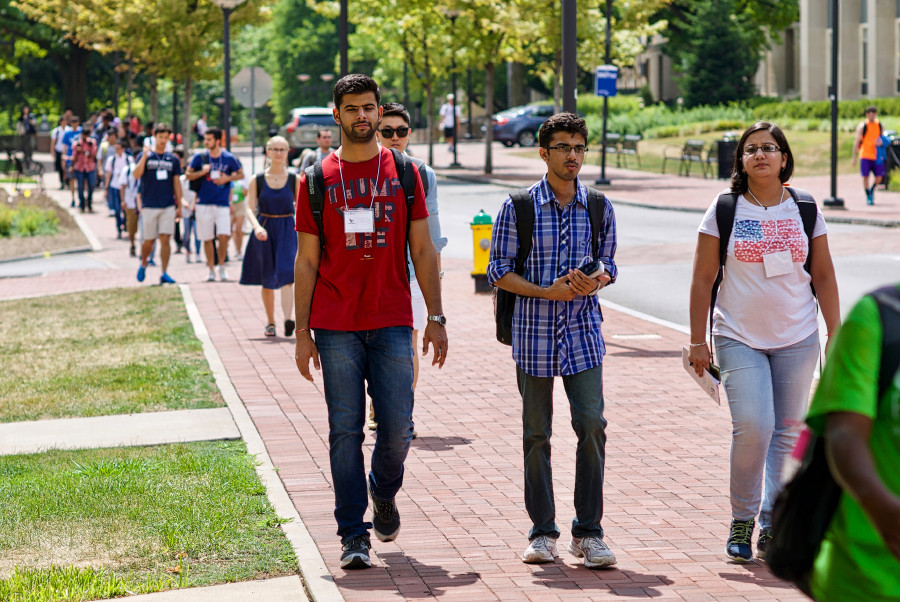National
More anxiety for Nepali students in the US with decision to send home those enrolled only in online classes
Many universities, including Harvard, have decided to go online for the next academic year, meaning foreign students will not be legally allowed to remain in the United States.
Elisha Shrestha
When Mohamed’s university in the US state of Texas abruptly moved all classes online in the middle of February because of the Covid-19 pandemic, he felt that it was a good initiative. Mohamed, who is in his final year of his bachelor’s degree, believed that going digital would help protect students and staff from getting infected with the coronavirus.
“Right now, I am taking 3 credit courses online from the safe space of my apartment, due to which I felt less anxious about the whole situation,” said 23-year-old Mohamed, who asked that he only be identified by his last name as he doesn’t want to jeopardise his visa status.
However, news on Monday shattered all of Mohamed’s peace of mind. The US’ Immigration and Customs Enforcement (ICE) agency announced that all active international students would not be allowed to stay in the country if they were only attending classes online.
“Nonimmigrant F-1 and M-1 students attending schools operating entirely online may not take a full online course load and remain in the United States,” said the agency in a release. “Active students currently in the United States enrolled in such programs must depart the country or take other measures, such as transferring to a school with in-person instruction to remain in lawful status.”
Students who fail to comply “may face immigration consequences including, but not limited to, the initiation of removal proceedings,” said ICE.
An F-1 visa is required for international students to attend high school and university in the United States whereas an M-1 visa is for vocational programmes.
For international students like Mohamed, who migrated four years ago to Texas from Butwal to pursue a computer science degree, this decision only adds more complications to their already desperate situation. Mohamed did not receive much financial aid and, like the majority of Nepali students in the US, had been supporting his studies by working a part-time job as a cashier in a department store.
“When the country went into the lockdown, I lost my job for more than two months. I am struggling to cobble together tuition fees of around $4,500 for the fall semester and now, the government’s decision is creating more problems,” said Mohamed, who is on an F-1 visa.
Although his university has yet to inform the students about the new ICE guidelines, Mohamed said he will not consider returning to Nepal, even if his college sticks by its decision to continue with online classes.
“Even if I return to Nepal till my college moves back to conducting in-person classes, I still have to pay the semester fee and since I don’t come from a wealthy family, I will have to work here,” said Mohamed, who works around 40 to 45 hours per week to sustain himself and his studies.
Like Mohamed, 23-year-old Bishal Thapa, an undergraduate student at the University of Idaho, also feels that for most self-financing students, returning home in the middle of a study programme is not a practical solution, given that most Nepali students rely on part-time jobs to survive.
“I would be more than happy to return to Nepal since it will be an opportunity to see my parents after all these years, but it is financially impractical,” said Thapa, who is also in the final year of his study. “I live in a rented room, which has a contract for a year. If I have to return to Nepal, I still need to pay for my room, apart from having to pay my semester fee.”
Foreign students in the US during the pandemic are already suffering in ways untold. Locked down in dorms and rented rooms thousands of kilometres away from family and unable to return home, many foreign students had just gotten through a difficult time when the ICE regulations were revealed.
Even if students do return home, many of them will be in vastly different time zones and many might not have access to reliable internet connections.
“There are also online websites and reading materials, which we will not be able to access if we return to Nepal,” said Thapa.
The ICE announcement came hours after some colleges and universities, including Harvard University on Monday, said that they plan to offer only online courses for the 2020-2021 school years as the US is still struggling to get the Covid-19 pandemic under control.
In the wake of the ICE announcement, many, including Thapa, are hoping that their universities will opt for a hybrid model of teaching, offering both in-person and online classes, so that international students like him will be able to remain in the US.
According to the US’ Department of Homeland Security, more than 1.1 million foreign students currently hold active student visas. Nepal ranks 12th in number among both undergraduate and graduate students in the US, according to a 2019 study by the Institute of International Education.
There are thousands of Nepali students in the US, most of whom are pursuing undergraduate degrees. Most Nepalis go to study with little-to-no financial aid and hope to pay off their college fees by working long hours, often illegally.
According to Santosh Pyakurel, president of the National Educational Consultancies Association, one of five umbrella bodies of education consultancies in the country, the ICE guidelines are impractical, stating that even if students decide to return home, Nepal’s international borders are still closed.
The Nepal government recently allowed in a few hundred Nepalis, mostly students, from the US, but bringing back the thousands of graduate and undergraduate students currently in the US would be a massive operation, especially during a pandemic, said Pyakurel.




 16.16°C Kathmandu
16.16°C Kathmandu (1).jpg)













